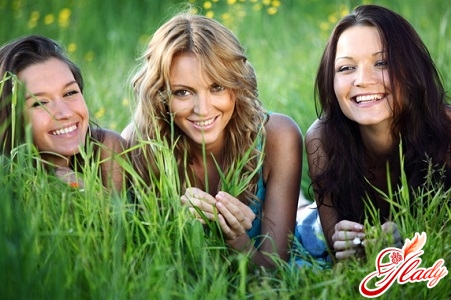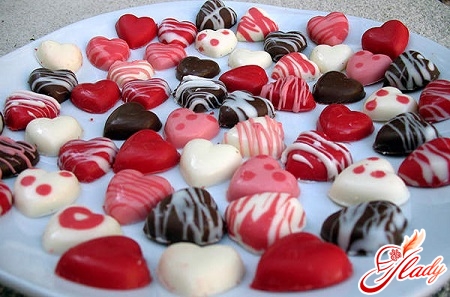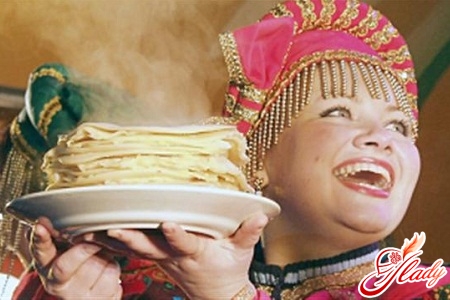 Venetian carnival, Mardi Gras, carnival inBrazil - a week before the great post on the globe rolling wave of enchanting holidays, one way or another commemorating the arrival of spring. Many go to the far end of the earth to participate in one of the carnivals. And after all, we also have a holiday, which without any stretch can be called a Russian carnival. This holiday is Shrovetide. A holiday with a truly Russian soul and scope. Bright and unrestrained, hospitable and cheerful. Where there are Italians and Brazilians! They can not understand the breadth of the Russian soul - songs, dances, dances, ice-skating, troika with bells, snow battles and, of course, pancakes. With sour cream, honey, cowberry, white fish and caviar. This holiday became a reflection of the Russian character, bright, hospitable and greedy to life and fun. Only the Russian people with such joy can see off winter and meet the spring in February, when the trees crackle from the frost, and blizzards diligently draw snowdrifts. And, in fact, why in February, you ask? After all, the first spring month of the calendar is March, and in our latitudes spring comes and does in early April. In order to understand the reason for this discrepancy, we will go on a short journey in time.
Venetian carnival, Mardi Gras, carnival inBrazil - a week before the great post on the globe rolling wave of enchanting holidays, one way or another commemorating the arrival of spring. Many go to the far end of the earth to participate in one of the carnivals. And after all, we also have a holiday, which without any stretch can be called a Russian carnival. This holiday is Shrovetide. A holiday with a truly Russian soul and scope. Bright and unrestrained, hospitable and cheerful. Where there are Italians and Brazilians! They can not understand the breadth of the Russian soul - songs, dances, dances, ice-skating, troika with bells, snow battles and, of course, pancakes. With sour cream, honey, cowberry, white fish and caviar. This holiday became a reflection of the Russian character, bright, hospitable and greedy to life and fun. Only the Russian people with such joy can see off winter and meet the spring in February, when the trees crackle from the frost, and blizzards diligently draw snowdrifts. And, in fact, why in February, you ask? After all, the first spring month of the calendar is March, and in our latitudes spring comes and does in early April. In order to understand the reason for this discrepancy, we will go on a short journey in time.
Dowry of antiquity deep
The first pancake - a lump, we say, and sometimes notwe know that initially this expression had a slightly different meaning and sounded differently. The first pancake - coma. That is, bears. Our ancestors called this holiday Komoditsey. It was the bears, these kings of the Russian forest, who were beguiled with ruddy blints, hanging a delicacy on the branches of trees. Bear-father was considered a defender among the Slavic tribes, and therefore to feed him was an honorable and obligatory tradition. But why pancakes are cooked for Shrovetide, and at the same time the holiday is called not Pancake, but Pancake Day? All this is easy to explain, if we recall that our ancestors could have only dreamed of such an invention as a refrigerator for us. The oil had to be stored in the cellars. To prevent it from becoming rancid and not lost, at the end of winter the food was started to be abundantly savored with oil. Hence the name: a fat Maslenitsa, a wide Maslenitsa. Our ancestors worshiped not only animals, they believed in the forces of nature. Pancakes were called upon the land of Yarilu, the god of the spring sun and fertility. Yarilo belonged to the gods, who died in the winter and resurrected again in the spring. He was represented as a beautiful young man on a white horse. The eternal bridegroom, awakening the earth to life, filling it with fertile juices, the flame of love warming people's hearts. The celebration of Maslenitsa was a symbol of victory over the winter, over the frost, over death and icy insensitivity. Life in those days was much harsher, and to save the family, livestock and farming intact and safe during the ruinous cold was a huge achievement, joy and an excellent occasion for the subsequent holiday. Pancakes used to be very different, not like those to which we are accustomed. The young people gathered flour in the palm of their hands and dipped their compressed hands into the water, the resulting lump of dough was baked in the oven. The baked round suns were almost mystical attributes of the spring meeting. Biting off this cake meant letting in the spring, the warmth of the sun and the joy of renewal. Until Christianity came to the land of Russia, the Carnival was celebrated at a strictly defined time - on March 21, the day of the vernal equinox. In one holiday, several events were concluded at once: the coming of spring and the new year. Therefore, we met him brightly and cheerfully. The fun began seven days before the vernal equinox. And finished seven days later. That is, the first week saw off the winter, thanked the forces of nature that they managed to survive the difficult season, and the second week they met the spring, again they offered thanksgiving prayers that the spring came, did not forget about them in their wanderings. Celebrate in Russia loved and knew how to always. Ironically for a modern man, but burning a scarecrow, or rather an effigy of the goddess of death and winter of Marena, was not a symbol of destruction. They spent the winter with honor, raising her all the rites of honor. In the same fire, on which the effigy of Marena was burned, anyone could throw unnecessary or worn out things, so that with the coming of the new year, they could get an update. A thing thrown into the fire was considered a symbolic sacrifice. With the advent of Christianity, unlike most pagan holidays, the Carnival was not forgotten and even changed at any rate. This shows that Shrovetide is loved by the people. And the Orthodox priests did not dare to deprive the people of this wonderful tradition. She was given a new meaning and the date of the celebration was changed. The Shrovetide week began seven days before the Great Lent. Since the dates of Lent are calculated depending on the day of the onset of Easter, the date of the beginning of the Carnival also changed. But the essence of the holiday, rites, fun remained the same. 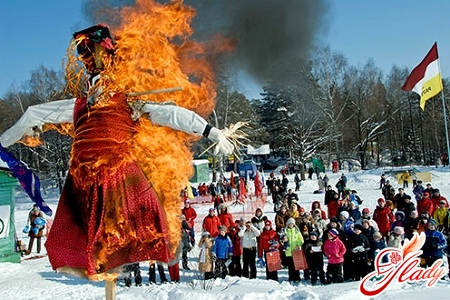
Holiday with the Russian soul
Noisy round dances, Maslenitsa pripevki, kulakbattles and skiing on a real Russian troika. And the spirit of renewal and pure sincere joy reigning over all this, that a long, harsh winter has passed, soon drops of melodic melodic songs will be melodically melodious, joyous songs will be written by starlings-mockingbirds-that's what people brought with them to this holiday. And therefore the festival of Carnival in Russia was held on a special scale. Moreover, on the eve of a long post I wanted to take a walk, as the last time. The festivities began early in the morning and ended late at night, in order to repeat the next day. And so for a whole week. They said: "How to meet Maslenitsa, so the year will pass." Like any ball of mummers, this holiday erased class boundaries. The boyars and peasants walked on equal footing. From historical records we know that Tsar Peter himself did not disdain these days to ride a triple or to take part in skiing from the mountain. Slides for sledding on the Shrovetide festival were built glorious. In large cities, the height of the slides reached 15 meters. The tradition was for young unmarried guys to go on a hill with beautiful, carved sleighs - the skill to show off and maybe find a bride for themselves. The sledge did it cunningly so that the fancy girl who ventured to move out with the guy from the mountain could only sit down on her knees to the guy. In the meantime, you are driving from the mountain, maybe a kiss from the lady can be broken. Girls, depicting the spring at the festivities, lashed unmarried guys, saying: "Marries you by the fall." In the main square, in the center, a high pillar was hacked, to the top of which hung some valuable thing as a prize. Things for the pillar were prepared long before the holiday, most often it was boots, male or female. Female boots were usually made of soft leather, beautiful, patterned with bright colored threads. The post was polished to smoothness, so that not one bitch would protrude. It was necessary to climb on it and get a prize. Around the pole, a lot of people gathered, jokes and jokes encouraged the brave ones. If a guy could get a pair of boots for a girl, then, of course, he is the most dexterous and clever. After such a feat it was possible to send matchmakers. The shopping rows were located immediately on the square. Counters were bursting with sweet goods. The wine brought from the nearest taverns and taverns was poured by the river. But they drank on holidays, although a lot, but not drunk. Because for a drunken holiday quickly ended. Drunken guy and on the hill will not be allowed, and the fist fight will not be accepted. Fisticuff fights were considered the main fun. Love in Russia to measure the strength of the heroic. Someone is fighting with fists, and someone is waving with a hammer, striking the anvil, - whose impact is stronger and more sonorous, and victory. Taking the snow fortress is also one of the old Russian fun. And if today the fortress is stormed by "infantrymen", then in the old days they were stormed on horseback. The real battles were unfolding, with military strategy and hard victories, in which children took part. Despite the seeming disorder of such a merriment, all the days of the Shrovetide week are painted. All events held on the holiday to this day strictly correspond to the established order.
Live traditions of Maslenitsa
In time, by Monday, to the very beginningholiday, erected ice or wooden slides, which must be topped with water from above. Children come first from the slides. They also make a doll out of straw, the burly beauty of Maslenitsa, and go home with it, singing songs and demanding treats. True, to see this tradition in its pristine form is now possible only in the villages, where it still remains unchanged. In the cities, a straw doll is carried across the square where the festivities take place, but everyone should give a treat, by whom the Pancake week is passed. On Tuesday - the wins. On this day, the newlyweds ride from the mountain. That is, those who married this year, must necessarily move out of the mountain. Guess - the farther the sleigh goes, the longer and happier will be the life together. And unmarried girls are given pancakes, which they must bring to the first guy who comes in, ask his name and thus learn the name of the man. This is a kind of Pancake-guessing. True, in the cities this tradition has also changed. Now on this day it is simply customary to leave the mountains in pairs. Ride on sleds or icy girls. Icecuffs are now called a plastic mat with a handle. And before the ice-colds were prepared very carefully: a basin or other similar utensils (a tub, for example) was brought out to frost, turned over and periodically poured the bottom with water so that the solidifying ice turned out to be evenly rounded. It depended on how fast and how far the old woman would die. Wednesday - gourmet, or pancakes with pancakes. The tradition of this day is the same as in the big cities, and in the most remote villages. On the third day of the carnival, the son-in-law is invited to visit his wife's mother. To regale it should be the best and fatty pancakes, and the mother-in-law should behave "more affectionately than her own mother." It is believed that this day can be a watershed in the sometimes not very smooth relationship between son-in-law and mother-in-law. By the way, on the same day those who did not have time to get married, can choose a bride. It is believed that the choice will be as successful as possible. Thursday - Take a walk. Just the very day when fist fights were held in the old days. All comers could be measured by force. The battles were fought and one-on-one, and in groups, usually divided into territories. The winners were honored in every possible way. To date, fisticuff fights are purely indicative and entertaining. But the symbolic battles for the capture of snow fortresses are very popular nowadays. Friday, or nightmares are an outdated tradition, but in some parts of Russia it lives and thrives. On that day the mother-in-law had to send her son-in-law everything from which to make pancakes. And he, in turn, had to bake pancakes himself, without assistance, and invite his mother-in-law to visit her to treat her with her own cooked pancakes. It was believed that the more delicious the pancakes, the better the son-in-law refers to the mother-in-law. That's when you could express yourself without words to your wife's mother and establish relationships, if there is such a need. Zolovkin gatherings or seeing off falls on a Saturday. From the very morning the daughter-in-law is busy in the kitchen, preparing a feast for the whole world, or more precisely, for all her relatives. On this day, relatives from both sides could talk, plenty of praising pancakes, so that in the evening everyone together go to the square where the stuffed Shrovetide is burned. Another sign for idle guys: the guy must have time to touch the luxurious breast of a scarecrow, so that this year must find a pair. And of course, the culmination of people's festivities is the burning of a stuffed pancake week. With songs and round dances. The bonfire rises high, everything flies away with fire and smoke, from which it must be freed. The end of the Shrovetide week was Forgiveness Sunday. On this day it is customary to ask forgiveness from all relatives, friends and relatives. Even in those to whom you do not feel guilty. This has a profound meaning: the humility of pride, the ability to admit guilt and repent in it - the best cleansing before the Great Lent. As the well-known saying goes: "Not all cats are carnival, there will be a Great Lent." 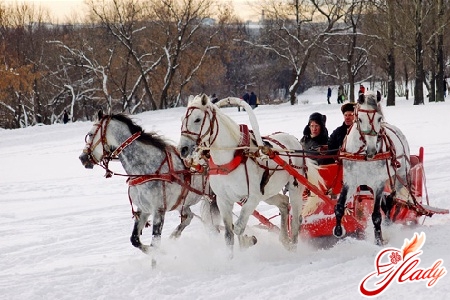
Not only Russian Carnival
Maslenitsa in the form in which we know it,exists not only in Russia. And we are not talking about any of the carnivals now, although this holiday has similar roots and with them. It turns out that the tradition of baking pancakes during the Shrovetide week is in many countries. In the Balkans, too, all week long pancakes are baked, however, there still exists a tradition to ride the streets of the villages ... in the trough. Such snows as in Russia, they do not have at this time, so that the people are twisted as best they can. In prudish England, they entertain themselves on the days of Maslenitsa, arranging competitions between women, who on the run must throw up in the air and again catch hot pancakes in the pan. True, not every hostess does it. The winner is the one that can bring to the finish the pancake, turned up in this way the maximum number of times and thus never dropped. Feels here is peculiar to the British humor. In Scotland, still fresh rye flour is baked from rye flour. Bake them in the ashes, but you remember that it was the story of the yellow Russian pancake that began with this. But the closest to all in their desire to stay in the days of carnival Russian skomorokhami were, of course, the Czechs. To this day in the small villages of the Czech Republic young guys smear faces with soot and to the music they go around the whole village with a painted wooden beam. Girls, carelessly caught in the way of such processions, the rope, on which the bar was tied, is hung around the neck and forced to pay off with kisses.
Feast with deep meaning
For our ancestors Maslenitsa carried a deepthe spiritual meaning of liberation from everything old, rebirth after winter sleep, readiness for a new life and purification from unnecessary and superfluous. After all, the ritual of burning Maslenitsa is a symbol of purification, a purifying fire. Undoubtedly, it is a pity that many of the traditions of this holiday can not be revived in the modern world. And few of the modern housewives, when they say the proverb about the first pancake, know that they are treating the bear-priest. In place of the old comes a new, with an equally profound meaning. But we really want that we do not forget about our own roots, and, stepping forward, did not lose in the way what is truly valuable: their own traditions and history. Perhaps the revival of the traditions of the Maslenitsa holiday will be the first step towards the revival of a truly Russian soul and a truly Russian character.





